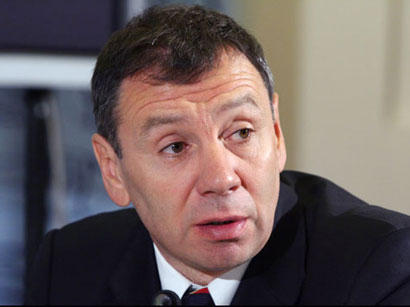Russian expert: Karabakh conflict cannot be considered as frozen

By Abdul Kerimkhanov
Nagorno-Karabakh conflict cannot be considered as frozen, Sergey Markov, Director of the Russian Institute of Political Studies, said at a conference titled "Azerbaijan in Eurospace".
The long-standing Azerbaijan-Armenia Nagorno-Karabakh conflict is still ongoing, it can break out into strong clashes at any time and cause serious consequences for the entire region. An example of this is the Armenian provocation committed in April 2016.
On the night of April 2, 2016, all the frontier positions of Azerbaijan were subjected to heavy fire of large-caliber weapons, mortars and grenade launchers by Armenian army. The armed clashes resulted in deaths and injuries among the Azerbaijani population. Azerbaijan’s counter-attack led to liberation of several strategic heights and settlements.
Markov reminded that one million refugees and internally displaced persons live in Azerbaijan. He added that the UN Security Council, the PACE, the European Parliament have repeatedly adopted resolutions that Nagorno-Karabakh is an integral part of Azerbaijan.
Russian political scientist stressed that no country recognized Nagorno Karabakh as a separate independent state.
He noted that some consider the Nagorno-Karabakh conflict to be frozen because there is no movement of the armed forces and no peacekeeping forces are stationed. However, Markov thinks that this conflict cannot be considered frozen, because various incidents take place there.
The expert recalled that hostilities did indeed take place on the contact line of troops in April 2016. He added that albeit the conflict did not last long - four days, but hundreds of servicemen and civilians died.
"Having talked over the phone with the leaderships of Azerbaijan and Armenia, Russia several times asked to stop the military hostilities," he added.
Markov mentioned that Armenia occupied not only Nagorno-Karabakh but also seven adjacent regions. Director of the Russian Institute pointed out that ethnic cleansing was carried out in these areas and the local population was expelled from these territories.
"The OSCE Minsk Group was created to resolve the conflict, certain steps were taken to hold negotiations, and at the initiative of Russia, the Kazan Principles provided for a compromise, according to which Armenia returns seven occupied regions to Azerbaijan," Markov noted.
He went on to say that the Kazan Principles imply that Azerbaijan lifts the economic blockade around Armenia and Nagorno-Karabakh, then Azerbaijan provides temporary status to Nagorno-Karabakh, and Armenian forces withdraw their troops from occupied Karabakh.
In conclusion, the expert said that negotiations are ongoing on these basis of these principles.
Armenia broke out a lengthy war against Azerbaijan by laying territorial claims on the country. Since the war in the early 1990s, Armenian armed forces have occupied 20 percent of Azerbaijan's territory, including Nagorno-Karabakh and seven surrounding regions. More than 20,000 Azerbaijanis were killed and over 1 million were displaced as a result of the large-scale hostilities.
To this day, Armenia has not implemented four UN Security Council resolutions on withdrawal of its armed forces from the Nagorno-Karabakh and surrounding regions.
---
Abdul Kerimkhanov is AzerNews’ staff journalist, follow him on Twitter: @AbdulKerim94
Follow us on Twitter @AzerNewsAz
Here we are to serve you with news right now. It does not cost much, but worth your attention.
Choose to support open, independent, quality journalism and subscribe on a monthly basis.
By subscribing to our online newspaper, you can have full digital access to all news, analysis, and much more.
You can also follow AzerNEWS on Twitter @AzerNewsAz or Facebook @AzerNewsNewspaper
Thank you!
